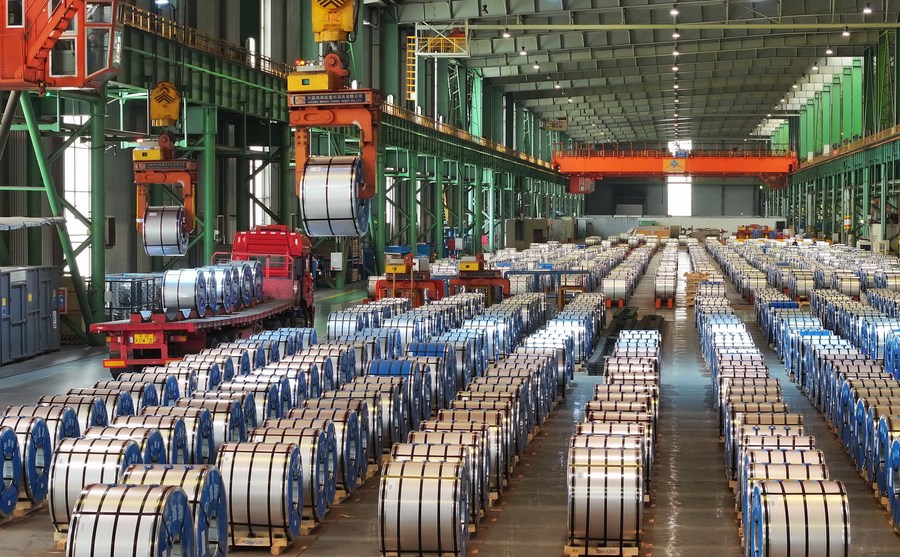
Indian steel minister’s proposal to raise import duties may backfire as it will lead to higher costs for the nation’s exporters who use steel as a key input in their manufacturing operations, analysts said.
H. D. Kumaraswamy, the minister for heavy industries and steel in Prime Minister Narendra Modi’s cabinet, said on Sept 4 that he will try to persuade the federal finance ministry to increase the import tariffs on steel to 10-12 percent, from the current 7.5 percent.
Kumaraswamy said the move is in the interest of India’s domestic steel industry as it will protect them from cheaper imports, especially from China.
ALSO READ: Not politics, not interest rates: India's surging economy at risk from water
Experts warned that higher import tariffs may prove counterproductive for India’s exports sector at large, as it will face higher costs.
Sebastian Morris, a former professor at the Indian Institute of Management in Ahmedabad, said Chinese steel products are very competitive in the Indian market, and the proposed import tariffs may hurt India’s export industry by pushing up their costs.
China produces steel in a very modern and efficient way and Indian producers cannot match up to that easily, said Morris.
Infrastructure cost in China is very low. Steel production requires electricity, coal and transport services and these are highly priced in India, he pointed out. India has large production but not as large as that of China.
READ MORE: Easing of visa restrictions good for improvement of China-India ties
Expressing concern over the impact of Chinese steel imports, Steel Minister Kumaraswamy said on Sept 4 that several players from the steel industry visited him in the last two months and discussed the problems they were facing in relation to the industry’s growth.
Speaking at an industry forum organised by the Indian Steel Association, the minister said, "The problem which you are facing from China, for that I will try to convince... the finance ministry to look at (raising the duty on steel imports) from 7.5 percent tax to 10-12 percent tax."
The minister also stressed the need to remain vigilant against challenges such as the global demand slowdown, especially reduced demand in China’s domestic market, the Press Trust of India news agency reported.
The steel ministry, Kumaraswamy said, is committed to ensuring that the journey towards “Aatmanirbhar Bharat” (self-reliant India) in steel remains undeterred. The Indian steel industry is on the brink of reaching new heights, he said.
India's steel making companies had expressed concerns about cheap imports even in the past. In the latest move, they have also written to the federal finance minister requesting immediate action to protect the domestic steel industry.
ALSO READ: India's extra duty on Chinese steel may raise local prices

Sajjan Jindal, chairman and managing director of JSW Group, one of India’s biggest steel makers, said in July that rising Chinese imports were affecting margins of domestic steelmakers. A.S. Firoz, former chief economist at the Economic Research Unit of India’s Ministry of Steel, said Indian steel makers can benefit if the import tariff is raised.
The Indian steel industry has been looking for protection from Chinese imports to reduce the uncertainties the domestic industry is facing, said Biswajit Dhar, a former professor at the Centre for Economic Studies and Planning at Jawaharlal Nehru University in New Delhi.
India’s steel trade deficit (difference between exports and imports) for the April-July period stood at around $1.38 billion, almost 30 percent higher than the $1.08 billion reported for the fiscal year ending March 2024, The Hindu BusinessLine newspaper reported on Aug 29, citing Steel Ministry data.
China was the largest source of imports, accounting for about 30 percent of the steel products imported into India, according to the report.
India has already initiated or extended anti-dumping measures on several steel products to tackle cheap imports from various countries, including China.
READ MORE: India likely to keep trade growth with China despite difficulties
In September last year, India’s Ministry of Finance issued a notification that an “anti-dumping” duty of $613 per ton is levied on flat-base steel wheels imported from China.
Explaining the reason for the decision, the notification said: "The evidence of export price indicates that the Chinese exporters are exporting the goods to third countries at significant dumped and injurious prices."
Last week, following a complaint by domestic players, the Directorate General of Trade Remedies, an arm of India’s federal commerce ministry, recommended imposition of anti-dumping duty on Chinese aluminium foil with an aim to guard domestic industry from cheap imports.
The writer is a freelance journalist for China Daily.


